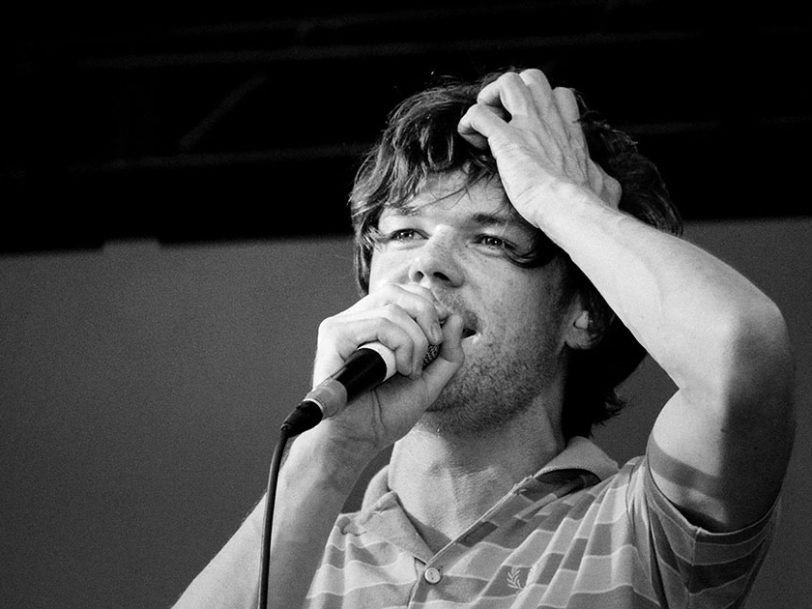In the summer of 2002, Idlewild seemed to be everywhere. Having secured a solid fanbase two years earlier with their 100 Broken Windows album, their follow-up, The Remote Part, brought everyone else on board. Its lead single, You Held The World In Your Arms, took the group into the UK Top 10 for the first time, peaked at No.4 in their homeland of Scotland, was used in UK TV coverage of the World Cup and Wimbledon, and later pitched up in the FIFA 2003 video-game soundtrack. The Remote Part itself went to No.3 in the albums chart, nestling beneath Red Hot Chili Peppers’ By The Way and Oasis’ Heathen Chemistry – a feat which Idlewild’s frontman, Roddy Woomble, tells Dig! is “still a wee bit absurd, to think about it”.
And yet, Woomble says, “Simply speaking, The Remote Part is the most popular, commercially successful record that Idlewild ever made. None of our other records achieved that level of popularity. So it’s the defining record for the group.”
Listen to ‘The Remote Part’ here.
“People saw the maturity and the development of ideas”
Having first received notice four years earlier, thanks to the post-hardcore abstractions of their debut release, the Captain EP, Idlewild were reconsidering what the band could be when they began writing songs for The Remote Part.
“100 Broken Windows was our breakthrough record… When that came out people were quite surprised,” Woomble recalls. The band, whose early live shows had been famously described by NME as “the sound of a flight of stairs falling down a slight of stairs”, were now being taken “seriously, really, for the first time. People saw the maturity and the development of ideas.
“We knew that we’d gone up a couple of notches in terms of what our records could translate,” Woomble continues. “We were on television and our gigs were selling out. We were thinking, Wait a minute, we’re making a connection with people. We can do this. We can make a record that’s even more palatable for the mainstream.”
“We were learning our strengths”
Rolling straight from touring in support of 100 Broken Windows to recording a batch of new songs written while on the road, Idlewild initially fell short of the goal they had set themselves. After entering the studio with producer Stephen Street, the group realised their new songs “were not strong enough”, Woomble admits.
“They were good but they required a lot from him,” Woomble says today. “Stephen Street’s produced some of my favourite records, particularly Smiths and Morrissey records, and it was a learning experience to know that, basically, there’s only so much he can do… It was a wake-up call for us, thinking, We need to write better songs.”
While the band regrouped, 100 Broken Windows belatedly hit the shelves in the US, almost a year to the day after its release in the UK. When Spin magazine named it “the No.1 album you didn’t hear in 2000”, kickstarting a whole new round of appreciation for the record, Idlewild were forced to put their new material aside and set off on a two-month US tour. While there, they booked studio time with Patti Smith Group guitarist Lenny Kaye, who, sitting in the producer’s chair, further helped the group hone their approach, and took a pencil to Woomble’s latest lyrics, encouraging the singer to refine them.
“We were learning from all these people we were working with, and learning from our mistakes and learning what our strengths were,” Woomble says. “When we got back from America, we went up to the Highlands, and that’s when we started properly writing songs.”
“You’re on a journey with the band”
Settling in a cottage in Inchnadamph, in the county of Sutherland, in the north of Scotland, Idlewild wrote The Remote Part’s defining songs, You Held The World In Your Arms, A Modern Way Of Letting Go and In Remote Part among them. “I knew it was going to be a really worthwhile thing – good for the soul and good for creativity,” Woomble says of the retreat. With the drums set up in one room, the group’s amps in another, and a communal area for eating and socialising, “It was exactly what we wanted it to be. It helped restore camaraderie between the band – because touring can sometimes rip that apart. After that, we had all the songs for the record.”




